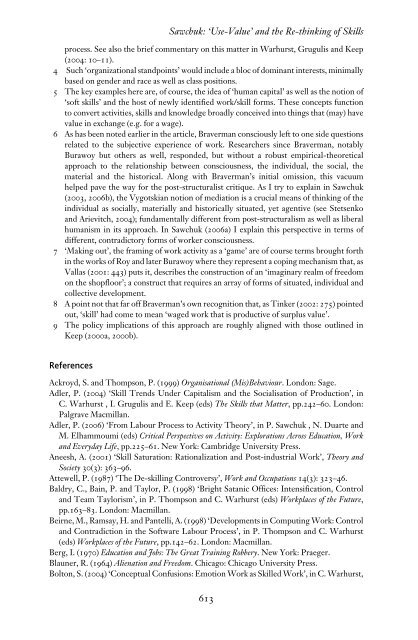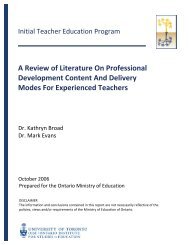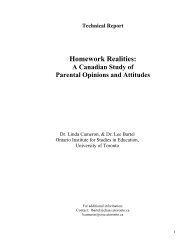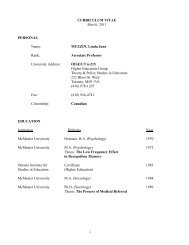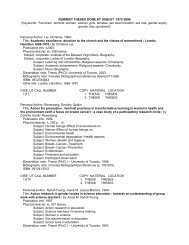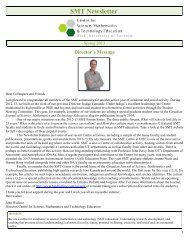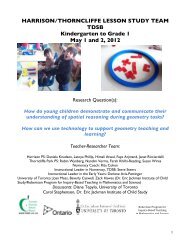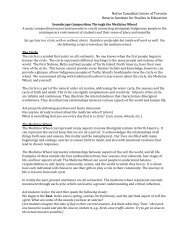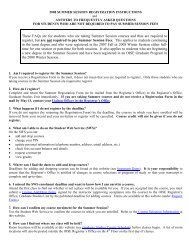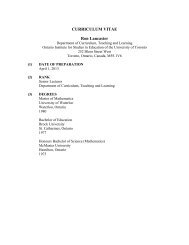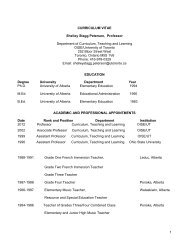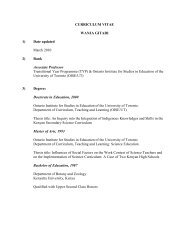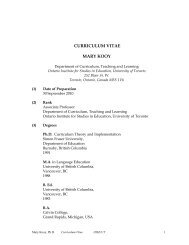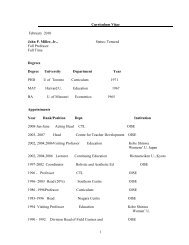'Use-Value' and the Re-thinking of Skills, Learning and the Labour ...
'Use-Value' and the Re-thinking of Skills, Learning and the Labour ...
'Use-Value' and the Re-thinking of Skills, Learning and the Labour ...
Create successful ePaper yourself
Turn your PDF publications into a flip-book with our unique Google optimized e-Paper software.
Sawchuk: ‘Use-Value’ <strong>and</strong> <strong>the</strong> <strong>Re</strong>-<strong>thinking</strong> <strong>of</strong> <strong>Skills</strong>process. See also <strong>the</strong> brief commentary on this matter in Warhurst, Grugulis <strong>and</strong> Keep(2004: 10–11).4 Such ‘organizational st<strong>and</strong>points’ would include a bloc <strong>of</strong> dominant interests, minimallybased on gender <strong>and</strong> race as well as class positions.5 The key examples here are, <strong>of</strong> course, <strong>the</strong> idea <strong>of</strong> ‘human capital’ as well as <strong>the</strong> notion <strong>of</strong>‘s<strong>of</strong>t skills’ <strong>and</strong> <strong>the</strong> host <strong>of</strong> newly identified work/skill forms. These concepts functionto convert activities, skills <strong>and</strong> knowledge broadly conceived into things that (may) havevalue in exchange (e.g. for a wage).6 As has been noted earlier in <strong>the</strong> article, Braverman consciously left to one side questionsrelated to <strong>the</strong> subjective experience <strong>of</strong> work. <strong>Re</strong>searchers since Braverman, notablyBurawoy but o<strong>the</strong>rs as well, responded, but without a robust empirical-<strong>the</strong>oreticalapproach to <strong>the</strong> relationship between consciousness, <strong>the</strong> individual, <strong>the</strong> social, <strong>the</strong>material <strong>and</strong> <strong>the</strong> historical. Along with Braverman’s initial omission, this vacuumhelped pave <strong>the</strong> way for <strong>the</strong> post-structuralist critique. As I try to explain in Sawchuk(2003, 2006b), <strong>the</strong> Vygotskian notion <strong>of</strong> mediation is a crucial means <strong>of</strong> <strong>thinking</strong> <strong>of</strong> <strong>the</strong>individual as socially, materially <strong>and</strong> historically situated, yet agentive (see Stetsenko<strong>and</strong> Arievitch, 2004); fundamentally different from post-structuralism as well as liberalhumanism in its approach. In Sawchuk (2006a) I explain this perspective in terms <strong>of</strong>different, contradictory forms <strong>of</strong> worker consciousness.7 ‘Making out’, <strong>the</strong> framing <strong>of</strong> work activity as a ‘game’ are <strong>of</strong> course terms brought forthin <strong>the</strong> works <strong>of</strong> Roy <strong>and</strong> later Burawoy where <strong>the</strong>y represent a coping mechanism that, asVallas (2001: 443) puts it, describes <strong>the</strong> construction <strong>of</strong> an ‘imaginary realm <strong>of</strong> freedomon <strong>the</strong> shopfloor’; a construct that requires an array <strong>of</strong> forms <strong>of</strong> situated, individual <strong>and</strong>collective development.8 A point not that far <strong>of</strong>f Braverman’s own recognition that, as Tinker (2002: 275) pointedout, ‘skill’ had come to mean ‘waged work that is productive <strong>of</strong> surplus value’.9 The policy implications <strong>of</strong> this approach are roughly aligned with those outlined inKeep (2000a, 2000b).<strong>Re</strong>ferencesAckroyd, S. <strong>and</strong> Thompson, P. (1999) Organisational (Mis)Behaviour. London: Sage.Adler, P. (2004) ‘Skill Trends Under Capitalism <strong>and</strong> <strong>the</strong> Socialisation <strong>of</strong> Production’, inC. Warhurst , I. Grugulis <strong>and</strong> E. Keep (eds) The <strong>Skills</strong> that Matter, pp.242–60. London:Palgrave Macmillan.Adler, P. (2006) ‘From <strong>Labour</strong> Process to Activity Theory’, in P. Sawchuk , N. Duarte <strong>and</strong>M. Elhammoumi (eds) Critical Perspectives on Activity: Explorations Across Education, Work<strong>and</strong> Everyday Life, pp.225–61. New York: Cambridge University Press.Aneesh, A. (2001) ‘Skill Saturation: Rationalization <strong>and</strong> Post-industrial Work’, Theory <strong>and</strong>Society 30(3): 363–96.Attewell, P. (1987) ‘The De-skilling Controversy’, Work <strong>and</strong> Occupations 14(3): 323–46.Baldry, C., Bain, P. <strong>and</strong> Taylor, P. (1998) ‘Bright Satanic Offices: Intensification, Control<strong>and</strong> Team Taylorism’, in P. Thompson <strong>and</strong> C. Warhurst (eds) Workplaces <strong>of</strong> <strong>the</strong> Future,pp.163–83. London: Macmillan.Beirne, M., Ramsay, H. <strong>and</strong> Pantelli, A. (1998) ‘Developments in Computing Work: Control<strong>and</strong> Contradiction in <strong>the</strong> S<strong>of</strong>tware <strong>Labour</strong> Process’, in P. Thompson <strong>and</strong> C. Warhurst(eds) Workplaces <strong>of</strong> <strong>the</strong> Future, pp.142–62. London: Macmillan.Berg, I. (1970) Education <strong>and</strong> Jobs: The Great Training Robbery. New York: Praeger.Blauner, R. (1964) Alienation <strong>and</strong> Freedom. Chicago: Chicago University Press.Bolton, S. (2004) ‘Conceptual Confusions: Emotion Work as Skilled Work’, in C. Warhurst,613


